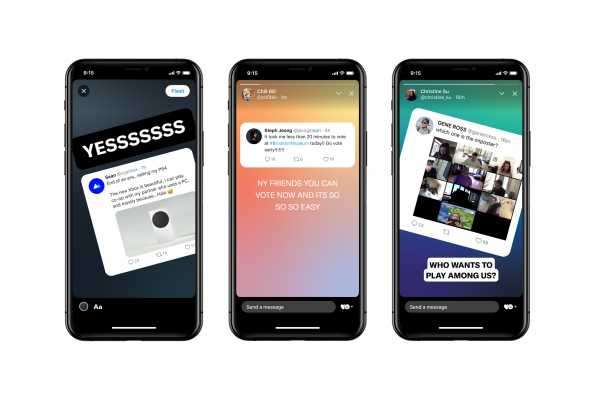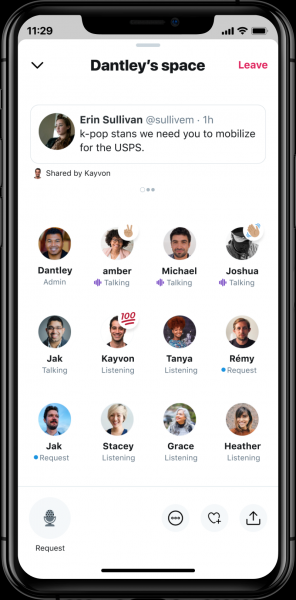
This story is part of a group of stories called

Uncovering and explaining how our digital world is changing — and changing us.

Twitter is finally letting users post ephemeral content, starting today.
The new feature — which has been tested in various markets this year — is called Fleets, and it looks an awful lot like Snapchat Stories. Twitter is also testing out a new audio feature called audio spaces that largely resembles the embattled, invitation-based startup audio app Clubhouse which launched earlier this year. Together, these new efforts show how Twitter, a famously public-facing platform, is attempting to expand how people interact on its platform.
Twitter, of course, is doing what Facebook has done many times: imitating aspects of its competitors’ successful products in an attempt to stay on the same footing. These new features also indicate that Twitter, like Facebook, is increasingly interested in private and group-based interactions. Both new tools show that Twitter wants to appeal to users who might be more reluctant to share publicly and permanently on the platform. In terms of active users, Twitter is still quite a bit smaller than Facebook, Instagram, or TikTok.
“It’s no surprise that the typical conversation on Twitter is a short burst of high-brevity exchanges back and forth between multiple people,” said Twitter product lead Kayvon Beykpour. “That’s very powerful. But if we want to allow for a wider range of conversations to unfold, we need to support other formats. We need to support other use cases that help people have more thoughtful debate, more thoughtful exchanges, that you can’t pack into 280 characters.”



The new Fleets feature, for example, allows users to post to their followers content that disappears after 24 hours. It really does look a lot like Stories on Facebook and Instagram — and Snapchat. Just as they are on Facebook and Instagram Stories, links to Fleets appear in the top portion of the Twitter app, and they’re also accessible by clicking through someone’s account profile picture.
Like Instagram and Snapchat Stories, people will be able to share reactions to other tweets, videos, and photos. Eventually, users will be able to incorporate stickers and live broadcasts, the company said. Notably, Twitter has not built a way to prevent someone from taking a screenshot of a Fleet or a way to provide a notification when someone takes a screenshot of your tweet.
Importantly, Fleets can’t be retweeted or shared. Replies to Fleets will be private and will function as part of Twitter’s existing direct message system. The goal, in part, is to beckon users reluctant to post publicly on the app to engage in this way. Again, Fleets launches today worldwide, so every Twitter user, including President Trump, will have access to the new feature.

Then there’s audio spaces, an audio-based conversation tool. Spaces builds on the audio tweets feature Twitter launched earlier this year that allowed people to post recordings of their voice up to 140 seconds long. That tool has continued to roll out through this fall, and the company is also incorporating transcription features in 2021, following criticisms that the tool isn’t accessible to people who are deaf or hard of hearing.
The idea behind audio spaces is to make Twitter’s audio feature more conversational. With the new feature, a user will be able to start a conversation and then allow others to participate or listen in. The company likens the feature to a “well-hosted dinner party” and anticipates that the tool will be used for debate. Yes, it looks a lot like Clubhouse.
Audio spaces won’t be available to the general public yet. Twitter still plans to do some experimenting and — also like Clubhouse — plans to start rolling out the feature through a limited number of invitations.
“We are going to launch this first experiment of spaces to a very small group of people, a group of people who are disproportionately impacted by abuse and harm on the platform, women and those from marginalized backgrounds,” said Maya Gold Patterson, a staff designer at the platform.
The company reiterated that all content on Twitter, including Fleets and audio spaces, is subject to Twitter’s rules. Just like regular tweets, Fleets are also subject to Twitter’s various labels, including those for false or misleading content.

While these new and upcoming features are an attempt to get users doing new things on its platform, they will also invite new challenges in content moderation. With audio spaces, for example, Twitter must tackle the tricky, technical question of moderating live audio content. Clubhouse has faced an uphill battle in creating and enforcing rules for its platform and recently came under scrutiny after a 300-person conversation devolved into anti-Semitic commentary. At the same time, the Fleets feature provides a new avenue for misinformation to spread, and the push toward more direct messages means non-public content is less accessible to other users and moderators.
Still, we shouldn’t expect Twitter to stop experimenting anytime soon. The company says it’s still studying how well its election season product modifications worked, and has hinted that it may continue to tinker with those features. Twitter is also exploring ways of facilitating private apologies and promoting forgiveness in an effort to encourage more empathy on the platform. Just last month, company CEO Jack Dorsey hinted that he’s interested in letting users choose their own algorithms, a move that could dramatically alter Twitter as we know it.
All these moves are signs that the platform isn’t interested in limiting itself to what it’s done before — and a reminder that social media companies still feel perfectly comfortable ripping off each other’s products.
Open Sourced is made possible by Omidyar Network. All Open Sourced content is editorially independent and produced by our journalists.
Will you help keep Vox free for all?
Millions of people rely on Vox to understand how the policy decisions made in Washington, from health care to unemployment to housing, could impact their lives. Our work is well-sourced, research-driven, and in-depth. And that kind of work takes resources. Even after the economy recovers, advertising alone will never be enough to support it. If you have already made a contribution to Vox, thank you. If you haven’t, help us keep our journalism free for everyone by making a financial contribution today, from as little as $3.
Sourse: vox.com





